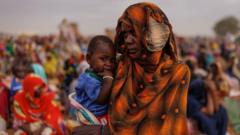Tensions escalate between Chad and Sudan as both countries navigate the complexities of a civil conflict exacerbated by foreign involvement.
**Chad Calls Sudan's Threat an 'Act of War' Amid Airport Targeting Dispute**

**Chad Calls Sudan's Threat an 'Act of War' Amid Airport Targeting Dispute**
Chad reacts sharply to Sudan's military general's declaration of targeting Chadian airports, classifying it as a declaration of war.
Chad has responded forcefully to a recent threat made by Sudanese military authority, labeling it a "declaration of war." The foreign ministry emphasized its preparedness to act in accordance with international law if any part of Chadian territory is compromised. The tension stems from comments made by Lt-General Yasir al-Atta, deputy commander of Sudan's military, claiming that the United Arab Emirates (UAE) is exploiting Chad's airports to ferry arms to the paramilitary Rapid Support Forces (RSF).
Sudan's army has repeatedly accused the UAE of providing support to the RSF during their ongoing brutal civil war, which has escalated to become the world's most severe humanitarian crisis. The United Nations has acknowledged the validity of claims regarding UAE's alleged arms smuggling through Chad, yet the UAE has publicly denied these accusations. Lt-Gen al-Atta's statements followed Sudan's recent legal move against the UAE at the International Court of Justice, further intensifying the situation.
During a ceremony held in tribute to an army officer killed in a recent RSF drone assault while attempting to regain control of the presidential palace, Lt-Gen al-Atta declared airports in Chad's capital N'Djamena and Amdjarass to be "legitimate targets." He asserted that direct retaliatory actions would be taken against not just the UAE but also against South Sudan and Chad's President Mahamat Déby.
Despite South Sudan’s denial of any affiliation with the RSF, the ongoing conflict has exacerbated regional instabilities, forcing thousands to flee from Sudan into Chad for safety. Chad's response explicitly condemned Lt-Gen al-Atta's statements, urging a transition from conflict to dialogue aimed at a peaceful resolution. The nation currently shelters hundreds of thousands of Sudanese refugees, predominantly from Darfur, where RSF violence is prevalent.
The situation escalated further when the RSF claimed control of al-Malha, a strategically significant location from Chad to Libya, which has been a focal point in battles against coalitions supporting the Sudanese army. Recent reports indicate significant casualties incurred during these skirmishes, impacting civilians and causing widespread humanitarian concerns.
Local activists have voiced their frustration as humanitarian access becomes increasingly restricted, with reports of road closures and a complete lockdown in areas controlled by the RSF. As families struggle for basic necessities like water and food, analysts suggest that the RSF’s intention is to solidify their presence in Darfur amid the army's advances in central Sudan, indicating a potential fragmentation of the country.
As the conflict continues to evolve, observers remain cautious of a possible de facto partition emerging as the warring factions entrench, creating a more complex regional landscape for Chad, Sudan, and their allies.
Sudan's army has repeatedly accused the UAE of providing support to the RSF during their ongoing brutal civil war, which has escalated to become the world's most severe humanitarian crisis. The United Nations has acknowledged the validity of claims regarding UAE's alleged arms smuggling through Chad, yet the UAE has publicly denied these accusations. Lt-Gen al-Atta's statements followed Sudan's recent legal move against the UAE at the International Court of Justice, further intensifying the situation.
During a ceremony held in tribute to an army officer killed in a recent RSF drone assault while attempting to regain control of the presidential palace, Lt-Gen al-Atta declared airports in Chad's capital N'Djamena and Amdjarass to be "legitimate targets." He asserted that direct retaliatory actions would be taken against not just the UAE but also against South Sudan and Chad's President Mahamat Déby.
Despite South Sudan’s denial of any affiliation with the RSF, the ongoing conflict has exacerbated regional instabilities, forcing thousands to flee from Sudan into Chad for safety. Chad's response explicitly condemned Lt-Gen al-Atta's statements, urging a transition from conflict to dialogue aimed at a peaceful resolution. The nation currently shelters hundreds of thousands of Sudanese refugees, predominantly from Darfur, where RSF violence is prevalent.
The situation escalated further when the RSF claimed control of al-Malha, a strategically significant location from Chad to Libya, which has been a focal point in battles against coalitions supporting the Sudanese army. Recent reports indicate significant casualties incurred during these skirmishes, impacting civilians and causing widespread humanitarian concerns.
Local activists have voiced their frustration as humanitarian access becomes increasingly restricted, with reports of road closures and a complete lockdown in areas controlled by the RSF. As families struggle for basic necessities like water and food, analysts suggest that the RSF’s intention is to solidify their presence in Darfur amid the army's advances in central Sudan, indicating a potential fragmentation of the country.
As the conflict continues to evolve, observers remain cautious of a possible de facto partition emerging as the warring factions entrench, creating a more complex regional landscape for Chad, Sudan, and their allies.




















